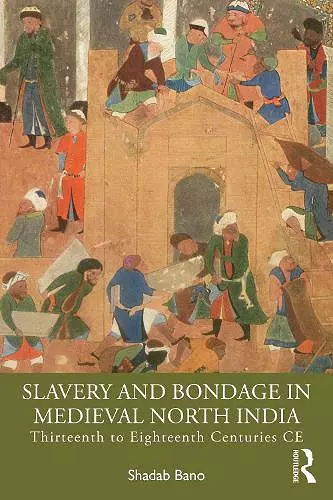Slavery and Bondage in Medieval North India
Thirteenth to Eighteenth Centuries CE
Format:Paperback
Publisher:Taylor & Francis Ltd
Published:15th Nov '24
Currently unavailable, and unfortunately no date known when it will be back

This book examines slavery in India from the Turkish conquest of North India to the centuries of Mughal rule. It focuses on the northern Islamic regimes’ treatment of slavery but not limited or determined by the actions and demands of the ruling class alone. Societies normalized the practices, and the norms were socially constituted, which included slaves’ acceptance, resistance, and use of agency in the process. It shows how the transformations on the ground made the social-economic and ethical environment of slavery no longer the same over the centuries and the expansion or contraction of slavery corresponded to the structural changes and ethical developments specific to the Indian milieu.
The volume will be of great interest to scholars and researchers of South Asian studies, history and slavery.
“In her Slavery and Bondage in Medieval North India, Shadab Bano explores a very important aspect of our social history, on which little direct research had so far been undertaken. By filling the gap, the author has extensively enlarged our knowledge of a largely ignored segment of the subject population of pre-modern times. Her work is a necessary read, surely, for all students of Indian social history.”
Professor Irfan Habib, Professor Emeritus, Aligarh Muslim University
“Shadab Bano’s book on Slavery and Bondage in Medieval North India is a pioneering work that offers a consolidated study of an important practice of owning and controlling human beings. Firmly grounded in archival material, the much needed study cross-fertilises subjection with warfare, labour, sexuality, ideology and economic change.”
Professor Najaf Haider, Centre for Historical Studies, Jawaharlal Nehru University, New Delhi
With careful sobriety, Shadab Bano shows in her book Slavery and Bondage in Medieval North India, how throughout the Sultanate and Mughal periods, the fates of various slave categories differed, and women experienced slavery differently from men. Her treatment of slavery permits the reader to evaluate (and relativize) blanket ‘communalist’ accusations of ‘Muslim oppression’.While sympathizing with the enslaved – especially with the menials among them – the author does not assume that mistreating people deemed inferior was particular to any socio-political system in South Asia or elsewhere.
Professor Suraiya Faroqhi, Ibn Haldun University, Istanbul
ISBN: 9781032902784
Dimensions: unknown
Weight: 453g
206 pages